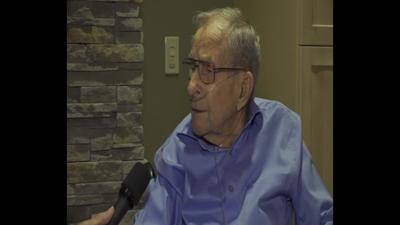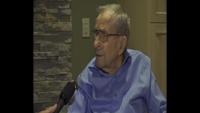Allen Gibbs, who is 100 years old, fought in the South Pacific with General MacArthur. Gibbs joins the nearly 300 faces that will be across Rapid City on the Veterans Honor Banner Program. Gibbs shares his story. "I was born in Nebraska, right across the river from Elk Point about. We moved to Elk Point when I was about seven, and then my family broke up when I was about 14 and I went with my brother to South Sioux City, Nebraska, and that's where I graduated. And then at graduation in 1938, there just wasn't any real jobs. So I bummed around looking for work wherever I could find it, and I ended up in Vermillion. I was there when Pearl Harbor hit. And so I went to San Diego intending to join the Marines. But a young couple that I'd work with and had gone to school with everything was living there. They convinced me to wait until I was 21 and in the meantime I'd switch my aim to the Army Air Force." When Gibbs went to the recruiting office he was asked if he wanted to take his exam this week or the next week. Gibbs soon found out that his answer of "Oh, let's wait till next week" was a mistake."I went down and told my draft board what I did, and they said, "Oh man, we got quotas to make." I think they hand-delivered my draft note. So I ended up in the infantry instead of an Air Force vet, but I survived it. I might not have survived The Air Force."Gibbs tells more about his training in the military. "We trained what's known as Louisiana Maneuvers as our major, and that's where they go and fight battles and whatnot. And then they shipped us off south to Virginia. And from there we went to West Virginia for mountain training. So, we were all sure was going to get sent to Italy. But we boarded ship, in January of '44 and it turned south. Went through the canal"Gibbs didn't mind missing Italy. In the military, Gibbs explains his duties."Well, as it was all radio. they somewhat they decided I'd had an aptitude for radio. So they sent me to a school right on base about three months. Then they sent me to Fort Benning Infantry School for radio training there. And then when we got to Virginia, they sent me to Norfolk to stay with the Navy for a while and study joint Army Navy communication for amphibious landings. After serving for 38 months, Gibbs had collected many stories. GIbbs shares one amusing incident. "We took this little island, Morotai, just to have an air base to, bomb the Sumatra and Java and the island towards Japan, where they were getting their fuel. And even though it was about 50 by 25 miles, we only secured half of it. If the enemy behaved themselves, we didn't bother them too much. But we set up a perimeter there, and all of us had to take our turn to go up and sit on that. So I took half a dozen men up there one time. There was a pretty good ravine, and I put a couple guys on one side and the rest of us on the other. We had what was known as sound power phones. There are like little tin cans, you kids made, except much better. But they were on all the time. So you could hear the chattering going on. And we told those guys, 'If you hear it, hear a noise, do not shoot. Throw a grenade. I could hear this excited talking over there. And I thought, oh, what's going on? And then about six shots out of a carbine. And then I could hear Sanchez saying, 'I'm hurt or I'm hit I'm hit. I'm hit!' I thought, Oh my god, I gotta walk over there in the dark now." And then they started laughing. I said "Ok, you jokers, what's the matter?" Well, apparently the guy leaned out to shoot and Sanchez leaned out above him. And there's a hot emptied went into his shirt." Another story that GIbbs shared is about General MacArthur. We were on New Guinea. They had taken serious amphibious training there. And the obvious hit next was an island called Halmahera. It had 40 to 60,000 Japanese on it estimated. We bombed, shelled that island every day and set observation planes over. So, there was no doubt in their mind, and actually in our mind that that was what we were going to hit. And then we formed a convoy pretty big with our 70 ships and started off and they said, 'By the way we're not going to Halmahera...we're going to Morotai, a little island 15 miles further.' And the Japanese had been so sure it was going to hit Halmahera that they pulled half for their defense from Morotai. So we took that island with almost no casualties. Drew a line across it, protected that. MacArthur had a base that he could bomb all of those Japanese oil supplies. And so I had a lot of respect for him after that."Allen, I understand you're a poet. Well I'm not a poet, I write verse, you write verse. Okay. But would you be so kind to pick out one of your favorite poems and recite it for us? Yeah. Gibbs also writes poetry. One poem he wrote as a tribute to a very good friend that lived in the same complex.
Toll the bells slower,
Drape the flags lower,
Another old soldier is called home.
He's a lonely survivor of the world's worst war,
But he'll muster with comrades once more,
For he is going home.
His ribbons attests
To where he's given his best
At hostile and foreign shore.
As honors unfold,
His eulogy is extolled.
He's the brave young warrior,
Once more at peace for he is home.
No more will tears fill his eyes when he hears the rifle and bugle's farewell.
No more must he ache
When protestor's forsake
Ole' Glory and our anthem as well.
There are reunions in store
With those gone before,
Even those who are never found.
So ring the bells loudly,
Wave the flags proudly,
Let the greetings in heaven resound
Welcome this soldier home.
Looking for more news and information? NewsCenter1 Media Group has you covered go to
NC1.TVtoday for all of your Western South Dakota and Wyoming news today.



